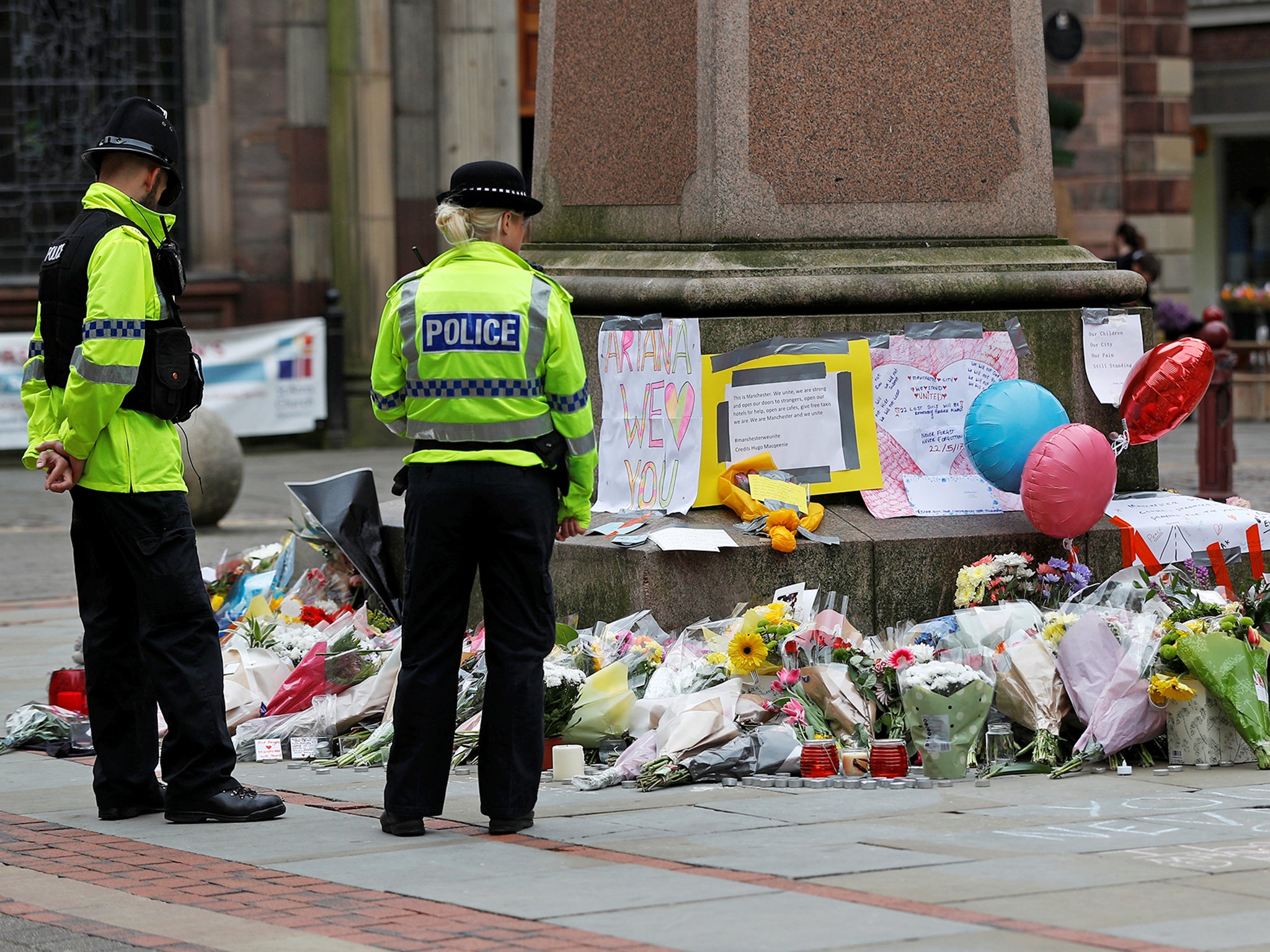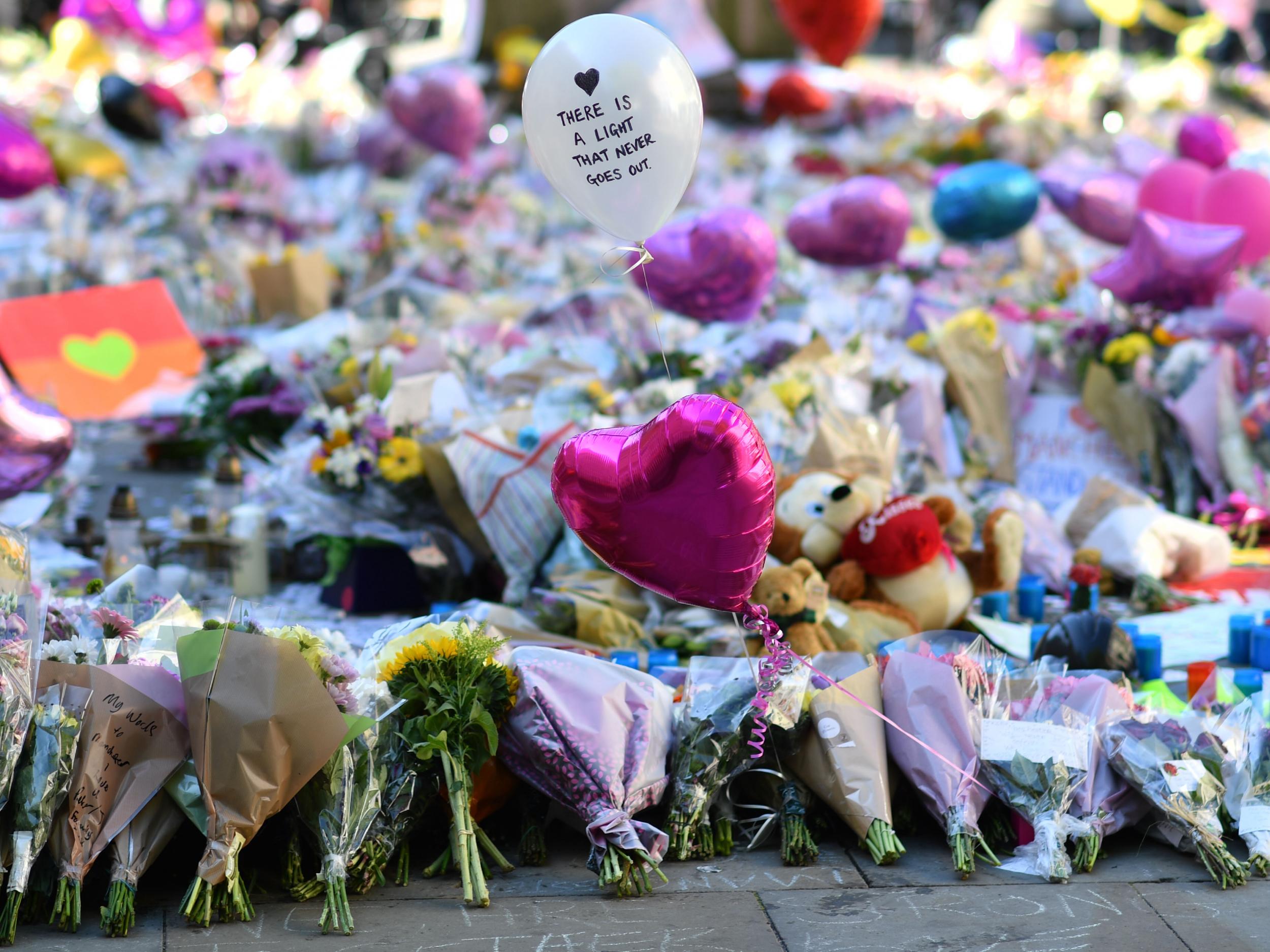Manchester attack anniversary: Police off work with PTSD a year after bombing, officer reveals
Exclusive: 'I’ve seen my fair bit of trauma but it’s the worst I’ve ever seen'

Your support helps us to tell the story
From reproductive rights to climate change to Big Tech, The Independent is on the ground when the story is developing. Whether it's investigating the financials of Elon Musk's pro-Trump PAC or producing our latest documentary, 'The A Word', which shines a light on the American women fighting for reproductive rights, we know how important it is to parse out the facts from the messaging.
At such a critical moment in US history, we need reporters on the ground. Your donation allows us to keep sending journalists to speak to both sides of the story.
The Independent is trusted by Americans across the entire political spectrum. And unlike many other quality news outlets, we choose not to lock Americans out of our reporting and analysis with paywalls. We believe quality journalism should be available to everyone, paid for by those who can afford it.
Your support makes all the difference.Police officers who responded to the Manchester Arena bombing continue to suffer from trauma a year after the terror attack, with some unable to patrol the city centre because of horrific reminders of the night.
An officer who was among the first on the scene where 22 people lost their lives told The Independent a “huge amount” of his colleagues were off work with post-traumatic stress disorder (PTSD).
The man, who did not want to be identified, said the atrocity had pushed mental health issues “to a head” for officers already responding to violent incidents.
“A lot of secondary trauma has come through now, not just for people who were there on the night but the detectives who had to take on the investigation,” he added.
“Greater Manchester Police (GMP) have had to move people out of the city centre divisions because they’re struggling to be around the area. It’s just caused upheaval.
“People deal with things in different ways – a lot of people have been moved and a lot of people have struggled to come back into work.
“There’s some that haven’t come back since and will probably never come back, people who have left the police.”
The officer, who has himself been diagnosed with complex PTSD, was among the first on the scene of the bombing on 22 May last year, when Isis supporter Salman Abedi detonated a homemade bomb among crowds of Ariana Grande fans leaving a concert at Manchester Arena.
He described driving past families leaving the venue “singing and dancing, completely unaware that had gone on” before getting closer to the foyer.
“As we pulled up there were hundreds of people running down the steps, they were covered in blood,” he said.
“There were reports coming out of an active shooter and a bomb, it was incredibly confusing, and we ran straight into the foyer.
“We were confronted with a scene I couldn’t possibly describe... I’ve seen my fair bit of trauma but it’s the worst I’ve ever seen.”
The GMP officer said he tried to help young victims, many of whom were surrounded by friends and family.
He said there were “incredibly brave” bystanders including security staff and first responders doing their best to help the wounded before paramedics arrived.
“They were the real heroes – they were just there,” he added. “I’m no bloody hero, I did what everyone else did.”
Eight-year-old Saffie Roussos was the youngest victim, while 10 of those killed were under 20 years old.
Police said more than 800 people suffered “physical and psychological injuries” in the blast, which was the deadliest terror attack on British soil since the July 2005 bombings.
The number of emergency services personnel who suffered trauma while responding to the atrocity is not publicly available, but the GMP officer believes it is a “huge amount”.
“Operationally you can tell because there are so few people in work,” he added.
“It isn’t just because of the Arena… the police service is on the way to an absolute mental health crisis. I’ve never seen it like this.”
The officer said welfare checks carried out by some senior officers in debriefings had appeared “macho” before the bombing, with offers of counselling swiftly glossed over.
“It ticks a box but then nothing was dealt with and you’ll literally be going to the bathroom to wash blood off your hands and coming out and then they’re like ‘yep, you can go to a burglary’,” he added. “It was like a dripping tap and the glass got full.”
GMP says it has offered bespoke support to officers who responded to the Manchester Arena bombing, while forces across the country have been running campaigns for Mental Health Awareness Week.
But the officer said there was more work to be done to change the “get a grip” attitude ingrained in parts of the police force.
“Mental health has just been ignored in the past, it’s ‘crack on and deal with it’, but it’s a big issue that needs to be looked at,” he added.
The Police Federation said a step had been taken in the right direction following a national meeting on wellbeing attended by the policing minister earlier this year.
“Resilience in the service is at an all-time low and officers are being put under inordinate amounts of pressure which is taking its toll on their health and wellbeing,” said Ché Donald, vice-chair of the association.
“The unprecedented cuts to the police service have meant that officers are under more strain now than ever before as officers are being asked to do more and more with fewer resources and it has been inevitable that the increased pressures they’re facing have had an impact on their mental health and wellbeing.”

Officers are entitled to full pay for up to six months of sick leave in a one-year period under law, and then half pay for a further six months.
But superiors can grant extensions on a case-by-case basis, particularly if their incapacity is directly attributed to the execution of their duty – as with terror attacks.
Police continue to investigate the Manchester bombing as a live murder inquiry, with a sustained team of around 100 GMP officers on the case.
“The events of 22 May will forever be etched into the history of Manchester,” Assistant Chief Constable Russ Jackson said.
GMP Chief Constable Ian Hopkins told The Independent: “The attack at the Manchester Arena has had an enormous impact on the families of the 22 individuals murdered and the hundreds more injured and traumatised. Many officers and staff saw and dealt with things that no one should have to deal with.
“It is therefore understandable that the attack has also had a psychological impact on many of our officers and staff who were involved on the night of the attack and in the days, weeks and months since this terrible event occurred.
“We now know that more than 1,000 officers and staff were affected with varying degrees of involvement.
“Within two hours of the attack a Superintendent was appointed to work with the Police Federation to provide welfare support in the first few hours and beyond. A range of support has been provided for all officers and staff that have needed it. This was done quickly because we have learnt the importance of appropriate welfare support over the years.
“The welfare support that was available was recognised as being of a high standard by the independent Kerslake Review into the Manchester Arena Attack and support remains in place for those that require it.
“There is no doubt that, given the scale of the response to the Arena attack, we didn't get that support right for everyone initially as we all came to terms with what had taken place. We have worked very hard over the last 12 to ensure everyone's needs have been catered for and will continue to do so.”
The bomber’s brother Hashem Abedi remains in custody in Libya, and British authorities have applied to extradite him back to the UK to stand trial for allegedly helping the plot.
Mr Jackson said he was grateful to Libyan authorities for considering the extradition request, adding: “In the meantime, we will continue to gather evidence, searching for as much detail about what happened and evidence of anyone responsible whilst supporting the families, many of whom who are going through unimaginable pain.”
A national one-minute silence will be held at 2.30pm on Tuesday, when Prince William and Theresa May will be among those attending a remembrance service at Manchester Cathedral alongside families, survivors and first responders.
Later, more than 3,000 singers from local choirs will join forces and share the spirit of solidarity at the Manchester Together – With One Voice event, including a choir of people who were at the arena when the blast struck.
At 10.31pm, bells will ring out from buildings across the city centre to mark the moment of the attack. Other commemorations include messages on Trees of Hope through Manchester, and a charity football match between emergency services and celebrities.
Join our commenting forum
Join thought-provoking conversations, follow other Independent readers and see their replies
Comments